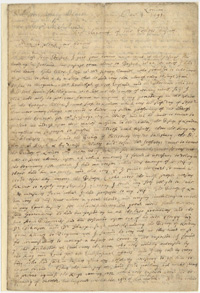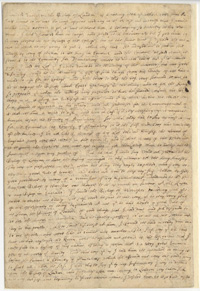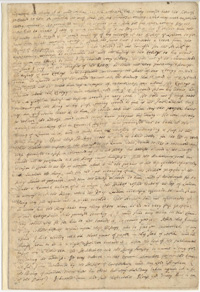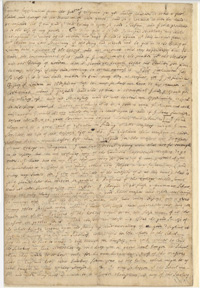MS43.04: Francis Nicholson Papers
Commissary Blair letter to Governor Nicholson, 1691 December 3

London.
Commissary Blair
to
Governor Nicholson
Decr 3. 1691
An Account of the College business.
May it please your honour
In my last from Bristol I gave your honour an account of our passage, our
landing in Ireland, my passage from thence to Bristol, wt all the news I had
then heard. This letter I left wt Mr Henry Daniel, who promised to take care
of it and to send it by a Ship that he said was then almost ready to sayl from
Bristol to Virginia. Mr Randolph of New England and Mr Sherwood who are.
now both bound for Virginia will save me the trouble of writing news, so yt I
shall need only to give your honour an account of my proceedings in the affair
of the College. When I came first to London which was the first day of Septr
there were many things concurred to hinder my sudden presenting of the address
about the College: for Mr Jeoffreys was in Wales, and till he came to towne to
present the address upon their maties accession to the crown, the Bishop of London
thought it not so proper to present an address about busines; then the King was
in Flanders; my friend the Bishop of Salisbury was at Salisbury, the Bi-
hop of St Asaph at his diocese in Wales; and before Mr Jeoffreys came to towne
the Bishop of London was taken very sick, yt for 6 months now he was not
able to stirre abroad; upon all which accounts I found it necessary to delay in
the beginning for which I had one reason which was enough of it self if
there had bin no more, and that was yt I found the Court so much al-
tered, especially among the Bishops, (who were the most proper persons
for me to apply my self to) yt really I found my self obliged to take
new measures from what I had proposed to my self. The Bishop of Lon-
don was at this time under a great cloud, and mighty unwilling to medle
in any Court busines; for notwithstanding his great merit from the pre-
sent Government, he had bin passed by in all the late promotions, and the
two Arch Bishopricks had bin bestowed upon two of his own Clergy viz.
Dr Tillotson and Dr Sharp: so yt notwithstanding the Bishop of Londons
great kindnes to Virginia yet I found he was not at this time in so
fit circumstances to manage a busines at Court as we expected. I found
yt the Archbishop of Cant. was the man who was wholly entrusted by
the King and Court for all Ecclesiastical affairs, and I was told by every
body who had [such] in business yt it was absolutely necessary to get him to
be our friend. Thus the time past on, and I did nothing but make friends
in privat against the Kings coming over, which was expected about the be-
ginning of October; but happened not till the 19th of that month. All this while
 I waited duely on the Bishop of London, as knowing well yt when ever this bu-
I waited duely on the Bishop of London, as knowing well yt when ever this bu-
sines came to be done he must appear cordially in it, or else no interest that I could
make could prevail to get it done without him, it belonging so entirely to his pro-
vince. I both discoursed him at large, and plyed him with memorials till I gott him to
be very perfect in the busines of the College; but at the same time I disliked the me-
thod in which he was going to put it, which was this. He advised me to put in the
address by way of petition to the King in Council, and the Council he said would re-
ferre it to the Committy for Plantations, where he did not doubt but yt it would
pass I told his Lop yt I never doubted the obtaining of the charter, but the great
difficulty would be in obtaining a gift of such things from his Maty as we had a
mind to ask for the College, and yt in order to this the best way seemed to the to
engage the Bishops about Court zealously in the thing, and to get the King
so prepared yt when the address was presented to him he should consult the Bi-
shops in it, it being an Ecclesiastical affair, and yt by their advice the whole bu
sines should be approved by his Maty, and all promised for the Encouragement of
it that we had a mind to ask, and then at last if it was necessary yt it might be
brought before the Comitty of plantations to see what they had to say against it, but
for the Council & the Comitty of plantations to be the first modellers and contrivers
of the busines I did not like it, because as his Lop told me himself the church of
England party was the weakest in the Council, and if there is any of the Revenue
to be spared the Courtiers are most apt to beg it for themselves than to advise the be/
stowing of it upon any public use. But all that I could say could not prevail wt the
Bishop of London to have the busines managed in this manner wt the King himself.
This was the first week in Octr, when the King was dayly expected, and I was re-
ally in a great dele of troubl: and knew not how to help my self. When, by Gods
good providence by means of a number of my acquaintances I was introduced to Dr Stil-
lingfleet Bishop of Worcester, one thought to be as much in favour wt the Queen
as any Bishop in England: I found the Bishop of Worcester exceeding well pre-
pared to receive me kindly. The first word he said to me was, yt he was very glad
of this opportunity of being acquainted wt me, yt he had heard a great dele of
me from the Bishop of London, of good things that I had done and still designed to
do for the Church in America, and he freely proffered to do me all the service that
lay in his power. After some discourse wt him, I found we had already run in-
to one errour and were like to runne into another. The first was yt all this
time we had neglected the Queen, who he assured me would be the best friend that I
could find in a busines of this nature, as being a person that is a very great Encoura-
ger of all works of charity. The other was yt as I told him we intended to bring it
before the Council & Comitty of plantations; which he assured me was the ready way
to spoil all. For, the first I had this to say yt by my Instructions I was to depend
upon the Bishop of London, who presently after my coming to London was taken sick
and was but just now beginning to stirre abroad again; I desired him to be so kind as to
 acquaint her Maty wt it and withal to ask whether her Maty would have the Address
acquaint her Maty wt it and withal to ask whether her Maty would have the Address
presented to her or whither we must wait for his maties coming who was now expected
every minut. He promised me yt he would do it. And for the other wrong step we
were like to make, I was as much convinced of it as he could be, but I showed him the
difficulty and begged yt he would make use of his interest wt the Bishop of London to per-
swade him to take another course. About the same time I received a letter from the
Bishop of Salisbury, (whose assistance I had desired) wt one enclosed for the Archbp of
Canterbury wherein he recommend me and the business of the College to his grace.
And upon my address to him I was received very kindly; he told me yt he remembred
me since I was wt the Master of the Rolles; he heard me very patiently discourse
the busines of our College, and inquired concerning the State of our Clergy in Vir-
ginia, he assured me yt he would do me all the kindnes that he could in my affair
and desired me to draw him up a couple of memorialls, one about the College &
and another about the Clergy and withal told me yt if I would follow his advice, he
did not question but yt the business would go very well. He told me I must have
patience, for the King at his first coming would be full of the Parliament busi-
nes, and if I would leave it to him, he would tell me when the proper time
to deliver the address, and would before hand prepare his Maty. He was utterly
against the making of it a Council busines, and promised me to talk wt the
Bishop of London in it, and to show him the necessity of menaging it first wt the
King himself. Both these Bishops were as good as their words, for the Bp of Wor
cester opened the busines of the College to the Queen who seemed to like it extraordina-
rily, promised to assist in recomending it to the King but advised ordered that the address
should not be presented till the King came himself. And the Archbishop took an
occasion to speak to the Bp of London about it in the presence of the Bp of Worcester, they
all recomended the thing, and for the right menaging of it, the Archbp. proposed yt the
King should be prepared, and then the address delivered to him, and if he thought fit to
make a Council busines of it he might; the Archbp desired leave of the Bp of London
to manage it wt the King, which the Bp of London willingly assented to, and so the
thing was put again into a right method. The Archbp told me afterwards yt
he never saw the King take any thing better than he did the very first proposal
of our College, and yt he promised frankly if I could find any thing in that Coun-
trey which was fit for him to give towards it, he would give it. After this I made
it my whole busines to wait upon these Bishops, and to give ym Memorialls of my
affair, I have already writ out three quire of paper in this sort of work, and all
things seem to be in a right disposition towards it. After the heat of the parliament
busines was a little over, the Archbishop gott the King himself to name a day for
presenting the address. It was Nov. 12. in the Council chamber before the Coun-
cil sat, I was introduced by the Archbp of Canterbury and my Lord Effingham (
the Bishop of London should have bin there but was that day taken again wt a fit
of the stone) I kneeled down and said these words. Please yor Maty here is an
 humble Supplication from the Govment of Virginia for yor Maties charter to erect a free
humble Supplication from the Govment of Virginia for yor Maties charter to erect a free
School and College for the education of their youth, and so I delivered it into his hand
He answered Sir I am glad yt this Colony is upon so good a design, and I will promote
it to the best of my power. The King gave it to the principal Secretary my Lord
Nottingham, & at whose office within two days I Recd it again wt this account from
Mr Warre my Lords Secritary, yt the King had ordered me to give in to the Bishop of
London both a Scheme of the College, and an account what was expected of him to-
wards the encouragement of it, and if I could concert the matter wt the Archbp
and the Bishop of London then it should be brought before the Comitty for plan-
tations, and pass if they had nothing to object against it. The parliments sits
so close yt it is an hard matter to find any body at leasure, yet I perswaded the
Bishop of London on Wedsenday last to come for half an hour to his chamber at
Whitehall, where I presented and read to him a Memorial I had prepared for
his Maties use; and the Archbishop and he are to wait an opportunity to speak
to the King about it. Every one thinks it is in so good a way yt it can not well
miscarry. I make it my whole busines to wait upon it, and if I hear further
before the Ships go your honour may expect another line about it.
I find
there will be a great deal of difficulty in finding of able Masters, and yet I am
sensible the life of the business lyes in this. In England their
Masters of their Colleges have a much easier life than is designed for the Masters and Professors
of our College in Virginia. I can have several young men that are fit enough
to be Ushers, but can not perswade any of the Eminent Experienced Masters to go
over. I have two in my eye that are very fit for it, if I can prevail wt ym
to undertake it. There is one thing which was forgott in my Instructions (and
it was my fault, for I was not sensible of the necessity of it at this time) that is
yt I should have bin ordered to provide a President of the College at the same
time wt the Schoolmaster and Usher. I thought yt at first a Grammer School
being the only thing we could go upon, a good Schoolmaster and Usher were enough
to manage that. But the Bishop of London and some other Bishops, and a great
many other skilfull men whom I have consulted, have undeceived me, and per
swaded me yt the President of the College ought to be the first man of all the
Masters we provide for it. Their reasons are these 1. That the good Success of
the whole business depends upon the setting up and executing of a good discipline at
first both among Masters and Scholars, which if it be left wholly to the Schoolma-
ster he will be sure to make it easy enough for himself, and will contrive to lead
the Scholars in such a method as will keep ym a great deal longer at School
than they needed to be kept; only for his own advantage. Most of the Masters
here in England keep their Scholars seven year at the latin, which might be as
well taught in four if they pleased. 2. It may so happen, yt the Schoolma-
ster and Usher may want as much to be inspected themselves; as any of the Scholars,